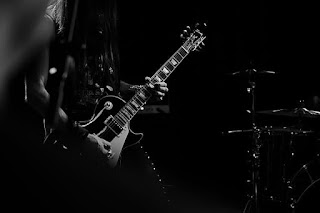I have little difficulty appreciating many of the classic progressive rock bands (e.g., early 70s Genesis, King Crimson, Jethro Tull, Yes) and their contributions. They were creative, took risks, were often extremely talented musicians, and crafted new sounds that would go on to influence many other bands. At the same time, it is easy to understand why punk was so necessary as a reaction to what had become overblown and pretentious. Its stripped-down sound and more egalitarian attitude were refreshing and necessary.
Although I was too young to appreciate what was happening at the time, I was the perfect age to live through a very similar period in the early 90s. Once again, music had become ridiculous in many ways (remember hair metal) that needed to be purged. The stripped-down sound coming out of Seattle that blended hard rock, punk, and garage rock, labeled "grunge" by those who desperately needed a label, did just that. While I had missed out on the opportunity to contrast the first Ramones album with one of the Yes albums, I vividly remember the impact of Nirvana's Bleach album and the work of many other bands when contrast with any of the hair metal albums at the time.
When things get overly stagnant, whether it is in music, art, literature, or even politics, people start to crave change even though they might not recognize their cravings until something new arrives. When "grunge" erupted in the early 90s, almost anyone who was asked to explain what about it appealed to them would say something about how it seemed genuine, real, and unpretentious in a way that other music at the time did not. We had been craving this without knowing it. Once we had something new that fit the bill, it was easy to appreciate it.
Why did Bernie Sanders catch on like he did in 2016? Many of us were sick of the status quo and ready for something new. For a brief time, he was that something new. We were so desperate for someone to deliver on what we had hoped President Obama would be able to do. Sanders promised that and more. And as imperfect as he was at the time, many were willing to overlook his flaws because he represented something we hadn't even known we wanted.
When I think back to what it was like to come of age in the repressive 80s, dominated by Ronald Reagan and Margaret Thatcher, it is easy to see why young people were talking about anarchy and listening to punk, hardcore, and thrash metal bands that tapped into our anger and pushed back against the establishment. It is also easy to remember how many bands at the time incorporated anti-religious messages in their lyrics. Some of the metal bands went in a blatantly Satanic direction, and some of the punk and hardcore bands provided more of a political critique of religion with which many modern atheists would agree. Religious tradition was widely recognized as an obstacle to change, and it did not help that the dominant political party in the U.S. had forged an alliance with Christian extremists. We were going to gravitate toward opposing messages.
Musical revolutions may be easier to understand than other kinds of revolutions, but I wonder if they may still be able to teach us something about other forms of social change. In some ways, I suspect that many young people today are having a similar experience to those of us who were young in the 80s. Their prospects seem bleak, and it does not seem like they have anyone in office fighting for them. They are tired of being told to go along with the traditions pushed by their parents and the churches to which they are dragged. They are looking for alternatives. In such a context, I have little trouble understanding why someone like Rep. Alexandria Ocasio-Cortez has become so popular.
Musical revolutions would not succeed if the new bands did not become popular. For them to displace the old ones, people need to buy their music, see their concerts, and support them in other ways. Similarly, political revolutions won't succeed unless candidates become popular and people vote for the new candidates who promote a revolutionary message.
